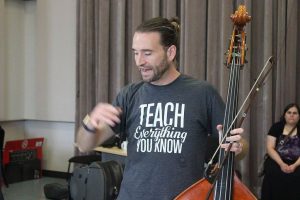It’s been quite a while since I’ve had the opportunity to sit down and write a solid multi-part series. I used to to this a lot on the blog–in fact, my book Road Warrior Without an Expense Account is based on a series of posts I did in 2006 and 2007 on the topic of music freelancing. I’ve also written This Crazy Business (7 parts), Basses, Planes, Trains, and Automobiles (5 parts), and A Week in the Life (4 parts). This series will likely be at least five or six installments, and I hope you enjoy it!
My Sweet Teaching Setup
I’ve had the good fortune of being a private double bass teacher in metropolitan Chicago for the last eight years, and during that time I’ve participated in helping dozens of students get into top music schools around the country.
I’ve learned a lot in the process!
From an outside perspective, it certainly seems like I’ve had a lot of students go on to major music schools. Students that have studied with me have gotten into Colburn, Boston University, Indiana University, The Cleveland Institute, Cincinatti College-Conservatory, Eastman, Northwestern University, DePaul, and many other institutions. Additionally, my students have taken top chairs at Illinois’ district and state all-state auditions, often making up over 50% of the district orchestra…and that’s for a highly competitive district of several million people, encompassing the north and northwest suburbs of Chicago.
As a teacher, it’s easy to feel good about these kinds of numbers, and while I’m sure that my actual teaching has at least some impact on student success, I have, from time to time, asked myself the following question:
“Do I turn people into good students, or do I just happen to teach good students?”
Am I Really a Factor at All?
Several significant factors go into making a successful music student, and though private teachers with successful studios may start to see themselves as all-powerful pedagogical beings, like cyborg “Teachinators” capable of transforming anyone into a star, the reality is usually that successful teaching studios are a result of a self-selection process on the part of the students. Success breeds success, after all, and serious students looking to pursue a career in music look at their successful peers and ask, “Who do you study with?”. A good studio therefore tends to keep getting better over time as referrals keep coming in, and teachers fortunate enough to be in this position simply have to be smart enough to recognize these “desirable” students when contacted. Some teachers take a completely egalitarian approach to their private studio, teaching anyone regardless or age, ability, or attitude. I do not. I have certain strengths and weaknesses as a teacher, and while I like to broaden my abilities as a teacher, I tend to take on students that seem like a good fit for my style. Also, I am maybe a teensy weensy little bit selfish, and want to work with self-motivated students and help get them into music school rather than tear my hair out with less responsive and interested students. Maybe that makes be lazy or lousy as an educator, but I don’t think so. I just like working with really serious students in the private lesson arena.
If I have to answer my earlier question (do I actually help make students good, or do I just attract the type of students likely to be good), I honestly have to say that it’s a little of both. I do have the ability to motivate students, I do understand what “the standard” is and try to move students in that direction, and I have a lot of battle tested techniques for solving technical and musical problems. I know that a lot of other bass teachers have these same techniques and abilities. What has happened for me (and surely happens with many private teachers) is both that I’ve gotten better over the years and I’ve started to draw more serious students. But let me tell you, getting a consistently high level of student got about 20 times easier when I went out in my own as a teacher.
Don’t think that bringing this up makes me insecure as a teacher–it doesn’t. I simply think that it’s important, from time to time, to take a step back and look with a wider perspective at the mtitude of factors that go into the private teacher/student relationship. It’s a very different dynamic from that of a classroom teacher or youth orchestra director, and it is probably the most important factor for music school-bound students. That’s a lot of responsibility as a teacher!
Self-Promotion (and why I hate it)
Free agent teaching has been good to me, but I know that it is not a good fit for everyone. I’ve never solicited a student in my life except for when I taught at the Unversity of Wisconsin-Whitewater (and it was my job to do so). Students have always found me. This blog doesn’t hurt for name recognition 😉 but that has never been my intent with this site. Even before the blog, I’ve always been trying to figure out how to reduce my student load, not increase it!
I always have had this feeling that it is somehow…well, sleazy to try to recruit students. In fact, one of my very first long-form blog posts dealt with this very issue, and how the pressure on music performance faculty to recruit students can cause you to make decisions for your own good and not for the good of these prospective music students Good thing I’m no longer on faculty at a university!
My educational objectives (these apply to both the blog and my own private teaching) are to be as much of a help as possible to prospective music students, regardless of whether these prospective students are my own long-time private students or people thousands of miles away that I’ve never met. These objectives permeate everything that I do, from the Contrabass Conversations podcasts, my gig stories, educational posts, and everything in between. In other words, I don’t blog, teach, or play for any sort of self-promotional reason. I find this kind of promotion personally distasteful (and I deal with it a lot as a quai-gatekeeper to the online double bass world).
I don’t blog to make myself “famous”. I do it because I am compelled to do it…and that’s why I teach, play, and do all the other things that I do.
Now, I’m not saying that I think it’s wrong to self-promote! I’m convinced that there is a seismic shift occuring for all creative people (it’s also happening in business, education, politics, and many other arenas), shifting control of content to the individual. This is ultimately a good thing, but it requires that we all become our own individual marketing teams and work to get the word out about what it is that we do, whether it be music, teaching, painting, or something entirely different.
I’m conviced that my reluctance to self-promote has held me back. Ironic that a guy with a book, a blog, and a podcast feels “uncomfortable” with self-promotion, huh? Again, I don’t do these things to make myself famous. I do them because I’m compelled to do them, motivated by a sincere desire to share knowledge.
More To Come…
For the next post in this series, we’ll take a look at the benefits and drawbacks of being affiliated with a teaching institution. Other posts in this multi-part series will cover materials that different teachers use in private instruction, my own personal étude/concerto/sonata educational brew, the path to music school, different styles of students and teachers (and how to achieve a good pairing), and more, so stay tuned!
Bass News Right To Your Inbox!
Subscribe to get our weekly newsletter covering the double bass world.

nice thoughts on the student-teacher relationship. And how it’s established.
The ‘teacher’ or ‘expert’ should let his or her reputation speak for itself. Word of mouth gets around, and doesn’t need any assistance from the teacher themselves.
oh, and that’s ‘ironic’ in the second last paragraph. You left out the ‘r’. 😀
“What if, rather than giving students the Capuzzi Concerto, I swapped out a variety of short pieces in different ranges of the instrument? What if I taught pivoting from the beginning rather than Simandl technique?”
IN my opinion, The Capuzzi, especially the new version in C (?)
is a lovely piece to give to a student. There are of course a variety of others. For me pivoting is cool with proper usage but then so is Simandl. Shall we stay open minded?
Chris
Don’t know why I’m just getting around to reading your wonderful blog. There’s a ton of useful info here, even for private piano teachers like me!
I was very interested in your thoughts on self-promotion since I just posted about fear of self-promotion and the private teaching studio. I think so many musicians find it distasteful to self-promote because we see sleazy advertising and subsequently think of all advertising as sleazy. Marketing your studio doesn’t have to center around Me Me Me, so much as the “product” you are offering, which is a lifetime of being able to play beautiful music, and all the fringe benefits that entails. Would love your response to my post!
Sorry, I though I knew how to post that html tag – got it wrong! The link: http://lowepianostudio.blogspot.com/2009/05/minute-for-marketing-5-dont-be-afraid.html